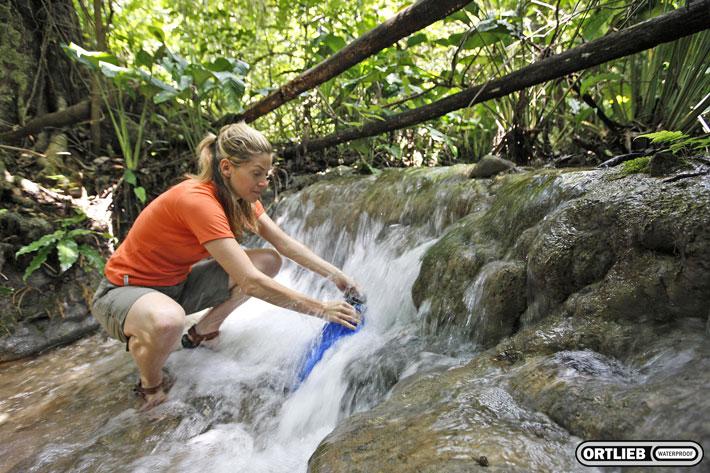In outdoor survival situations, especially in hot and desert regions, ensuring a reliable water supply is of utmost importance. This guide will cover various water sources, purification methods, and disinfection techniques for safe consumption.

- Water Sources: Nature provides several water sources, including:
- Surface Water: Rivers, lakes, streams, etc.
- Groundwater: Wells, springs, underground reservoirs.
- Biologic Water: Certain plants contain sufficient water content, such as banana plants, bamboo, cacti, etc.
- Atmospheric Water: Rain, snow, dew, and melted ice.
- Purification: While rainwater, spring water, well water, and flowing mountain streams can be consumed directly, stagnant or slow-flowing water may contain organic matter and bacteria that require purification. In survival conditions, the following simple methods can be employed:
- Use a container such as a canvas bag, polyethylene plastic bag, large iron can, or the end of a sock.
- Create layers at the bottom of the container with fine gravel, followed by sand, and charcoal. Repeat this layering process multiple times, with each layer approximately 2.5 cm thick.
- Drill small holes at the bottom of the container and pour water into it. Collect the filtered water using a cup.
Additionally, another purification method involves digging a shallow pit about half a meter away from the water source. Over time, clear and clean water will seep into the pit.
- Disinfection: Ensure water is free from harmful microorganisms by utilizing the following methods:
- Boiling: Boil water for at least 1 minute at sea level. Increase boiling time by 3-4 minutes for every 1000 meters increase in altitude.
- Chemical Disinfection: Use disinfectants like chloramine tablets, iodine, or halazone tablets. For instance, adding 2 chloramine tablets to 1 liter of water and letting it stand for 15-30 minutes achieves disinfection. If unavailable, use 8-10 drops of iodine per liter.
- Sterilization: To eliminate bacteria entirely, consider the following methods:
- Water Purification Tablets: Easily accessible and practical. Follow the instructions on the tablet packaging. Allow the water to settle for 30 minutes after purification.
- Iodine Tincture: Add 3 drops per liter of clear water or double the amount for turbid water. Allow the water to settle for 30 minutes.
- Household Bleach (5.25% Sodium Hypochlorite): Add 2 drops per liter for clear water or 4 drops for turbid water. Shake the water, let it settle for 30 minutes, and then use. Note: Bleached water may have a faint taste of sodium hypochlorite.
- Boiling: Boil water for 3-5 minutes to ensure complete sterilization.
Additionally, adding a pinch of carbon during boiling removes any discoloration. Stir the water to aerate and cool it, restoring its taste, or add a small amount of salt.
Conclusion: By understanding water sources and employing purification and sterilization methods, you can ensure a safe and reliable water supply during outdoor camping and survival situations. Always prioritize water safety for a successful and secure outdoor experience.

